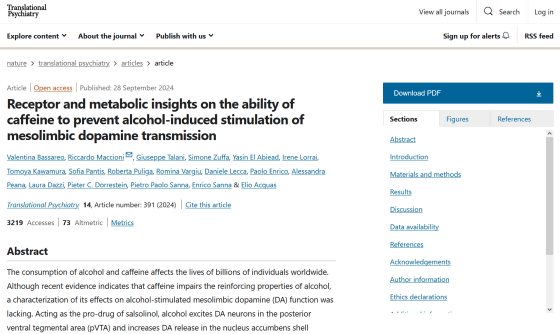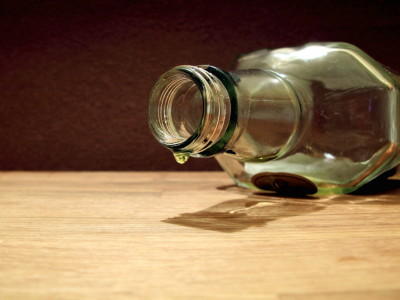Caffeine may help treat alcoholism by blocking dopamine

Alcohol and caffeine, both found in a variety of beverages, are chemicals that affect people's lives around the world and have been widely studied for their psychopharmacological effects. A team of Italian and American researchers has now shown that caffeine can block the effects of alcohol on the brain's
Receptor and metabolic insights on the ability of caffeine to prevent alcohol-induced stimulation of mesolimbic dopamine transmission | Translational Psychiatry
https://www.nature.com/articles/s41398-024-03112-6

Caffeine's impact on brain's mesolimbic dopaminergic pathway could reduce alcohol's addictive effects
https://www.psypost.org/caffeines-impact-on-brains-mesolimbic-dopaminergic-pathway-could-reduce-alcohols-addictive-effects/
Caffeine Seems to Have a Blocking Effect on Dopamine, And Here's Why : ScienceAlert
https://www.sciencealert.com/caffeine-seems-to-have-a-blocking-effect-on-dopamine-and-heres-why
In a 2020 study in mice, Riccardo Maccioni, a postdoctoral researcher at the Scripps Research Institute, and his colleagues demonstrated that caffeine blocks some of the behaviors conditioned by alcohol.
Maccioni and his colleagues hypothesized that the effect of caffeine on alcohol activity may be mediated by mesolimbic dopaminergic pathways, which are strongly linked to reward processing and the early stages of drug addiction, and whose activation releases dopamine and contributes to the perception of reward.
The study involved male mice, who were divided into groups into three groups: one that received only alcohol, one that received both alcohol and caffeine, and one that received a specific drug to compare with caffeine.

The results showed that caffeine effectively blocks alcohol-induced dopamine release, particularly in the nucleus accumbens, and may also prevent the production of a chemical called
'Because caffeine specifically blocks dopamine release in certain brain regions that mediate reward, consuming caffeine before alcohol may reduce the perception of alcohol-induced pleasure,' Maccioni said, arguing that consuming caffeine may protect against alcohol use disorder.
Furthermore, the study confirmed that caffeine blocked the effects of salsolinol and morphine when administered without alcohol, suggesting that caffeine may be useful in treating not only alcohol use disorder, but also other drug use disorders.
'The mice used in this study had no previous exposure to alcohol,' said Maccioni. 'It will be interesting to see the effects of caffeine on animals that are already dependent on alcohol.' 'We are then interested to test whether this research can provide insightful suggestions for potential therapeutic targets for alcohol use disorder.'

Related Posts:







